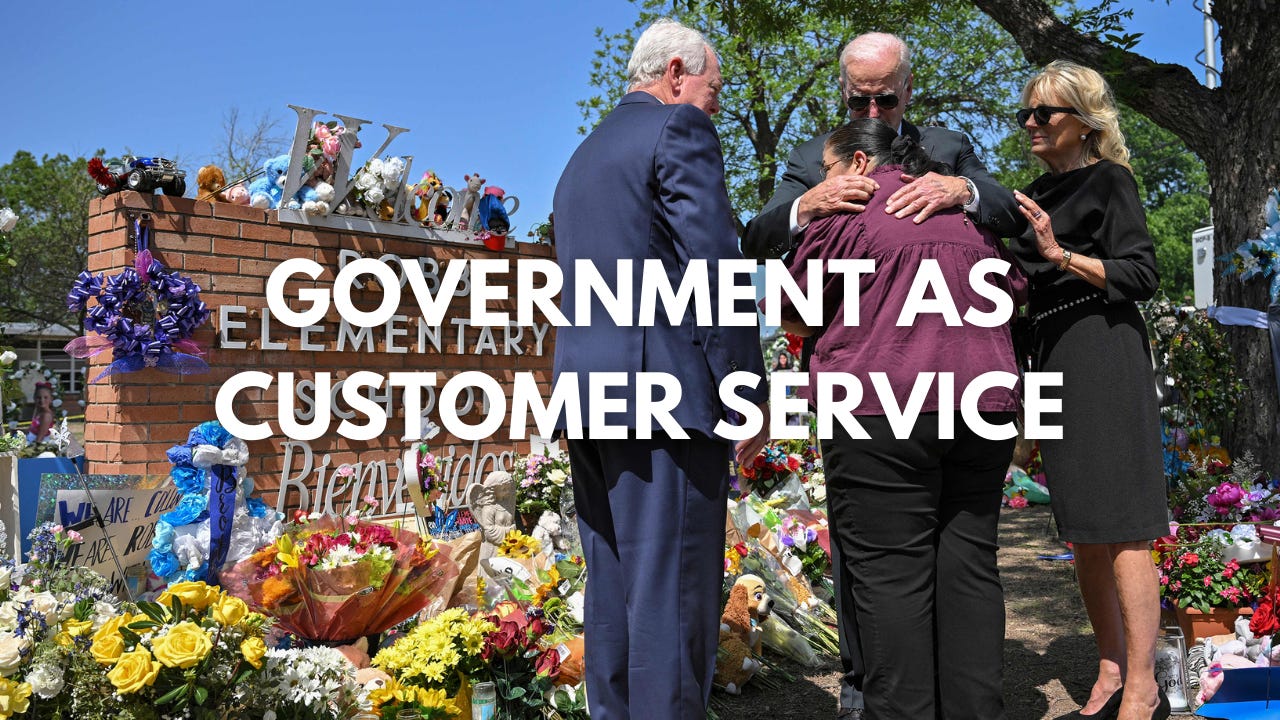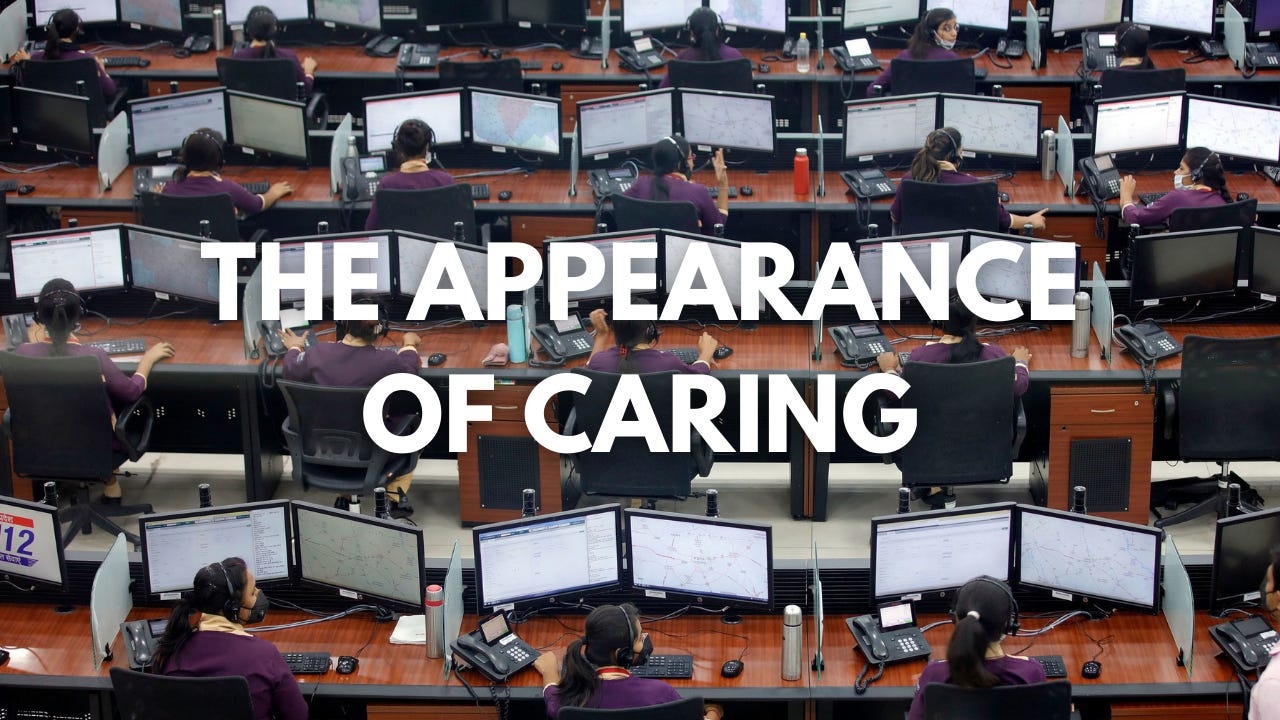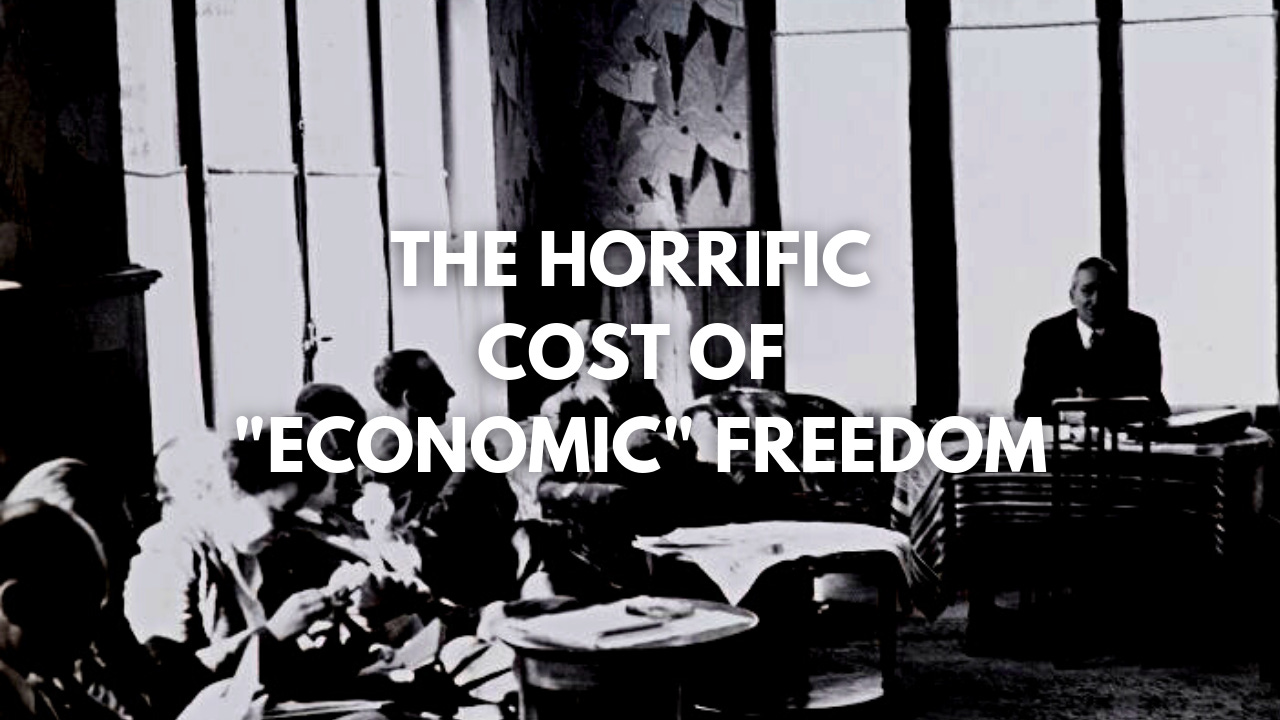Government As Customer Service
In a world of maximized profit and exploitation, there's no room for true representative government or empathy. Providing the illusion is everything
It was one of the worst jobs I ever had. A customer service representative for the Columbia House mail-order corporation at the call center in Terre Haute, Indiana. When I was hired, I was desperate. I came from a poor family and had less than a hundred dollars to my name. I was more than happy to sit in a cubicle and talk on the phone for eight hours a day.
But it didn’t take long to understand why my coworkers kept quitting. You’d see them get up in the middle of the shift, tears streaming down their faces, and make a panicked beeline to the door and then to their cars. More than once they’d break down on the floor and scream into their headsets at somebody somewhere around the country.
Columbia House was a ubiquitous brand, its advertisements virtually everywhere and its offers so good that nearly everyone had a subscription they’d failed to honor. By the time I got there, in the early 2000’s, the corporation was falling apart. And the consequences were undeniable. Everybody and everything was stretched paper-thin. Our processes had been scripted out to the very last detail, presumably by efficiency experts brought in to negate the money problems, and everyone was miserable from the managers down to the representatives.
Something I learned quickly and grew to detest was that I had virtually no power whatsoever. As a representative, my job was to represent the illusion of caring. To say that I was sorry. To listen calmly while irate customers who had been overcharged, their bank accounts overdrafted, their lives impacted negatively, yelled at and insulted me. My existence on the line was less to fix things than to present a human face to the processes.
Behind me was a labyrinth of automated systems I functioned within but had nothing in the way of understanding. The hoops we all jump through when trying to navigate these mazes, from entering customer codes and order numbers, to screaming at syrupy-sweet sounding recorded voices, all while being shuffled from one line to another, are designed to decrease the number of employees and also screen out callers, often by infuriating them to the point they’ll simply give up.
To put it another way, the rise of the call center and the customer service hell we all experience from time-to-time is largely a symptom of the neoliberal system. It is designed to provide the customer with the veneer of care while speeding up exploitation. It helps, particularly in the wake of a spate of bloody massacres, to remember that our politicians at all ranks, up to and including the President of the United States of America, now function more as customer service representatives than as dealmakers and leaders.
Their job is to gift this inhuman system that human face. To reflect back to the populace at large their anger, their frustration, their desperation, their grief. When I was at the desk and on the phone, I found that many callers simply wanted someone to hear them. When they asked if I could do something and I answered, honestly and truthfully, that there was literally nothing I could do even if I wanted to, that anger sometimes turned to acceptance. The notion that somebody had listened, that somebody else was as exasperated and powerless within the system, was a reminder that, deep down in the heart of it all, bells, whistles, programs, algorithms, there were still human beings wandering around, made something of a difference.
But it was hollow. The suffering continued. The frustration grew. And now, in our political system, we see that neoliberalism and its architecture of mechanization and bloodlessness has taken almost full control over the apparatuses of power.
The day I quit the call center was one of the best of my life. A weight lifted like I could never describe. It didn’t have to be that way. It didn’t have to operate with such callous inhumanity.
And now, looking at the wreckage of the American political system, I tell you, once more: it does not have to be this way.
Subscribe to Dispatches From A Collapsing State to support Jared Yates Sexton’s work and gain access to exclusive material, including a podcast and additional articles
In training for the job, I was taken through a series of test calls and scripts. These were introduced by human resource representatives, but doubtlessly created by the same kind of efficiency experts who built the automated systems. The formula was simple. The least amount of interaction possible to make the caller “feel heard” in the least amount of time. Speed was essential, but if the interaction left a caller feeling unheard, then chances are they would call again.
Now, in a beleaguered nation beset by a pox of shootings and growing authoritarianism, I can’t help but watch our politicians stumble through their responses and see corporate strategies in action. The tone of concern, the practiced empathy, it’s all less human and more public relations. Tested language. Prescribed processes. Some don’t even bother to get in front of a camera. They have aides or communication specialists fire off a PR tweet and get on with their lives while communities and families grieve.
In an era where government has been intentionally depowered, the best many can offer is to mirror the frustration back to the constituent and citizen. Even President Joe Biden, whose political career has been largely defined by his ability to take his own spate of personal tragedies and communicate empathy to others in pain, has been largely relegated to communicating his own frustration with the inability for politicians to work within the system. Its processes are too complicated, too set on countering change, reform, or progress.
I know that feeling. There were times an exhausted caller who’d phoned to complain about a charge on their debit card would break down over the line. The neoliberal system squeezes us for everything we’re worth, makes us work harder, takes away programs and safety nets, reduces us to numbers in a queue, literally kills us and the people we love, and so sometimes they were more than ready to just sob in exhaustion. And, as the representative on the line, another cog in the machine subject to exploitation and abuse within the system, I’d often join them in the sobbing, cognizant almost the entire time that if quality control was monitoring the call I’d undoubtedly get punished for going beyond the prescribed amount of empathy and care and, ultimately, extending the length of the call beyond the expected duration.
The consequences of neoliberalism are suffering and powerlessness among the masses while a select few reap the rewards. It is an profoundly unjust and unfair system and, as American declines like a hulking and doomed corporation, tragedies like Buffalo and Uvalde mount and mount. To do anything about any of it would lessen the efficiency of exploitation and profit. To do anything about any of it would interrupt the constructed environment most conducive to concentrated capital.
And so, our representatives continue to present the human face.
To say, I’m sorry. I know how you feel. I’m as frustrated as you are.
And I know this because I have said it myself.
The concept of neoliberalism that has infected the modern world has its roots in post-World War I Europe, where the rise of Nazism, Fascism, and Communism so spooked a set of economists that they pledged a new ideology that might protect their very specific idea of “freedom.”
At its heart is the work of men like Friedrich Hayek, an Austrian economist who likened nearly any government intervention as “tyranny.” Hayek and those surrounding him gazed at the political movements at the time and saw the danger of representative government and mass politics. They desired a return to the origins of “liberalism,” or the protection of personal property. In this way, governments would be largely turned into supportive bodies in the thrall of wealth and power. Human projects like housing, healthcare, and education were undoubtedly mishandled and better left to market forces to solve, meaning the government as a body dedicated to the public good was more or less destroyed.
We live in the wreckage of this movement. For the most part we are left uneducated about it, our schools and curricula barely mentioning any of what has happened, instead focusing on mythologies of American exceptionalism and hiding the fact that representative government has been co-opted by the people made exorbitantly and grotesquely rich by this reorganization.
Neoliberals hold the blame for our current crises, but also the detestable state of this public relations-centered state. Politicians have been purposefully depowered and now exist as vetoes on anything that might trouble the chosen state of things. The best things they can offer, by design, are their thoughts and prayers. The script is, much like the ones I relied on at Columbia, literally written by the powers that be.
The continued power of neoliberalism as an ideology and operating procedure is predicated on its ability to avoid public detection and scorn. Therefore, politicians, like a corporate customer service representative, must maintain the illusion that there is a human empathy at the heart of the matter. That this isn’t simply a system of algorithms and processes beyond their control.
If people understand the reality, there could be a reaction. A correction. A return to a system that care more about human beings and authenticity than a series of processes that maximize profit while minimizing humanity and human concern. It begins with a recognition that the problem exists and a rejection of conventional understanding that necessarily hides these issues just underneath the surface. It would be easy, after all, to hear the syrupy sweet recorded voice at the entry point to the labryinth of the automated system and be comforted, but the feeling of eerie discomfort tells us that things are most decidedly not okay.
The alternative is to accept this. To continue to drown in it. To get frustrated, to hang up the call, and forget it all because it is too large and it is too frustrating. Down that path lies only authoritarianism and collapse. More human suffering. We must demand more. We must continue to navigate these horrors and search for the actual living, breathing human hiding with the maze.







You have absolutely no idea how much this piece affected me. In fact it affected me enough to pony up the $7 a month and upgrade from the free version. Your experience at Columbia House really resonated with me. From 1989-2007, I worked as a teleservice representative for the Social Security Administration. You can probably imagine the kind of calls we had to deal with, day after day, month after month, year after year. And then they started introducing automated scripts, basically taking what little autonomy we did have away. My career in federal service ended with a week in a psych hospital and a disability retirement. Apologies if that was TMI, but your experience brought all of that back. And you were absolutely spot on to tie it all in with how government functions today; it’s actually how a lot of life in general functions. It’s really depressing if you think about it too much, so I’m going to end this and go find some chocolate or something.
Your article explains so much. Thank you.